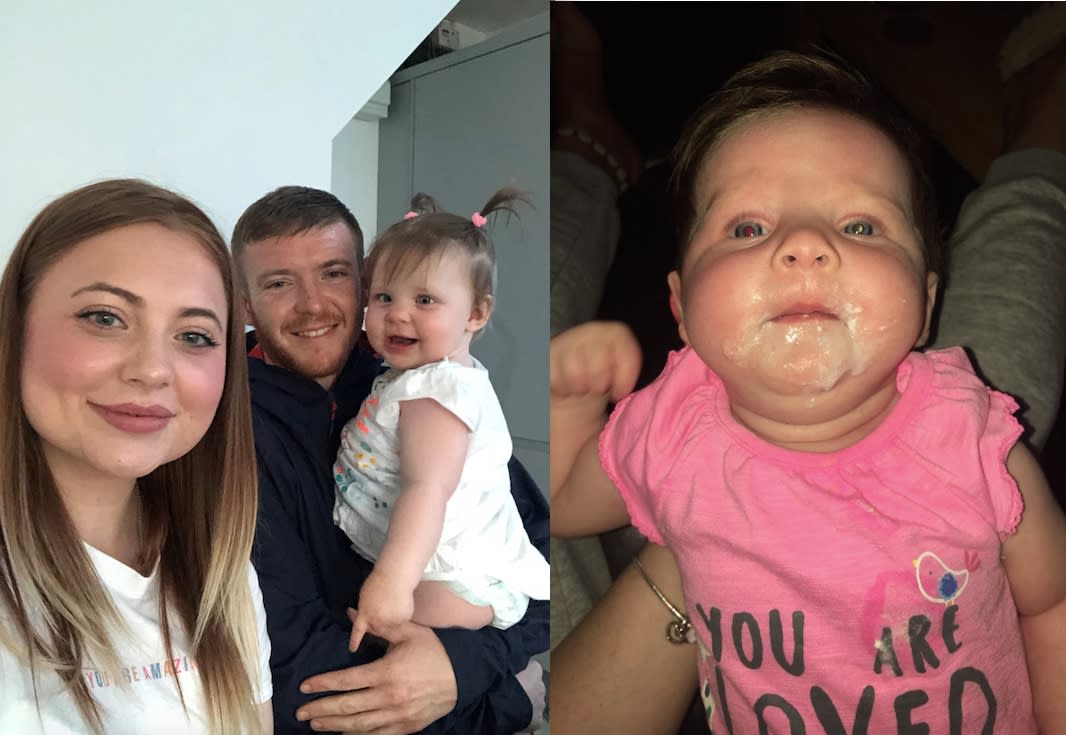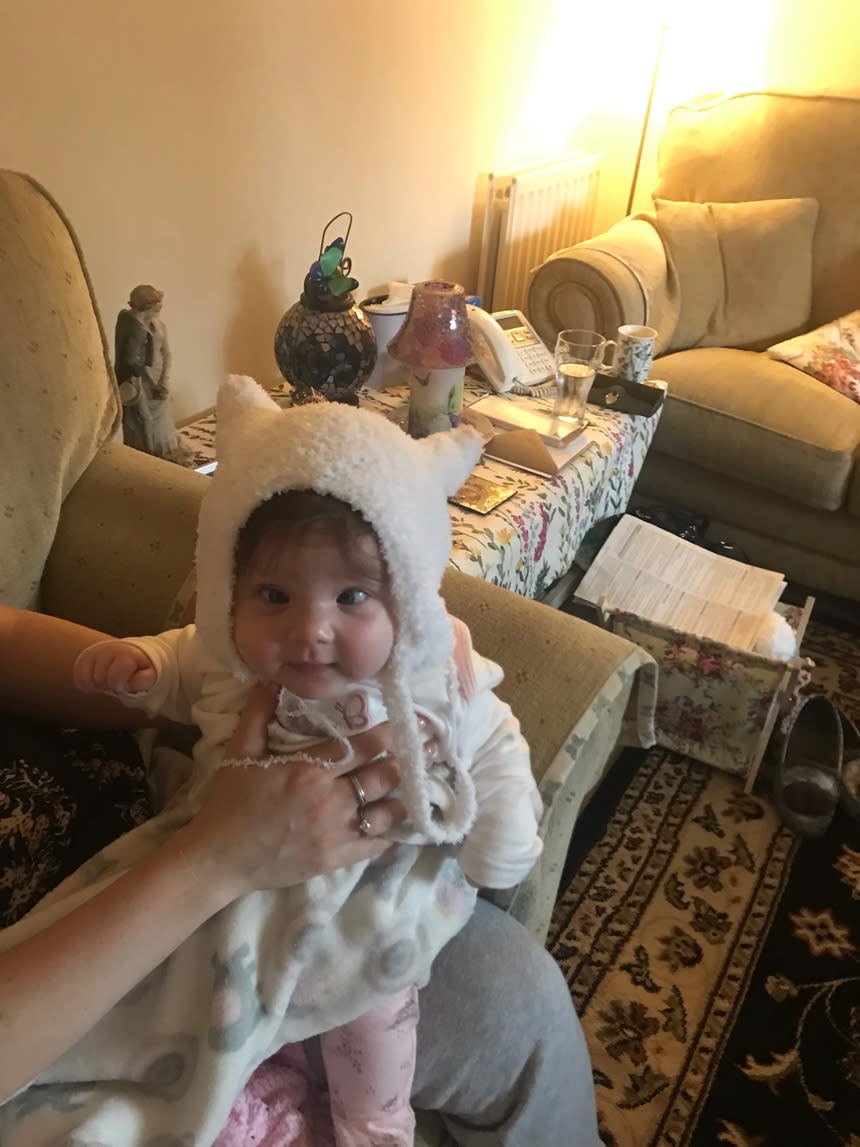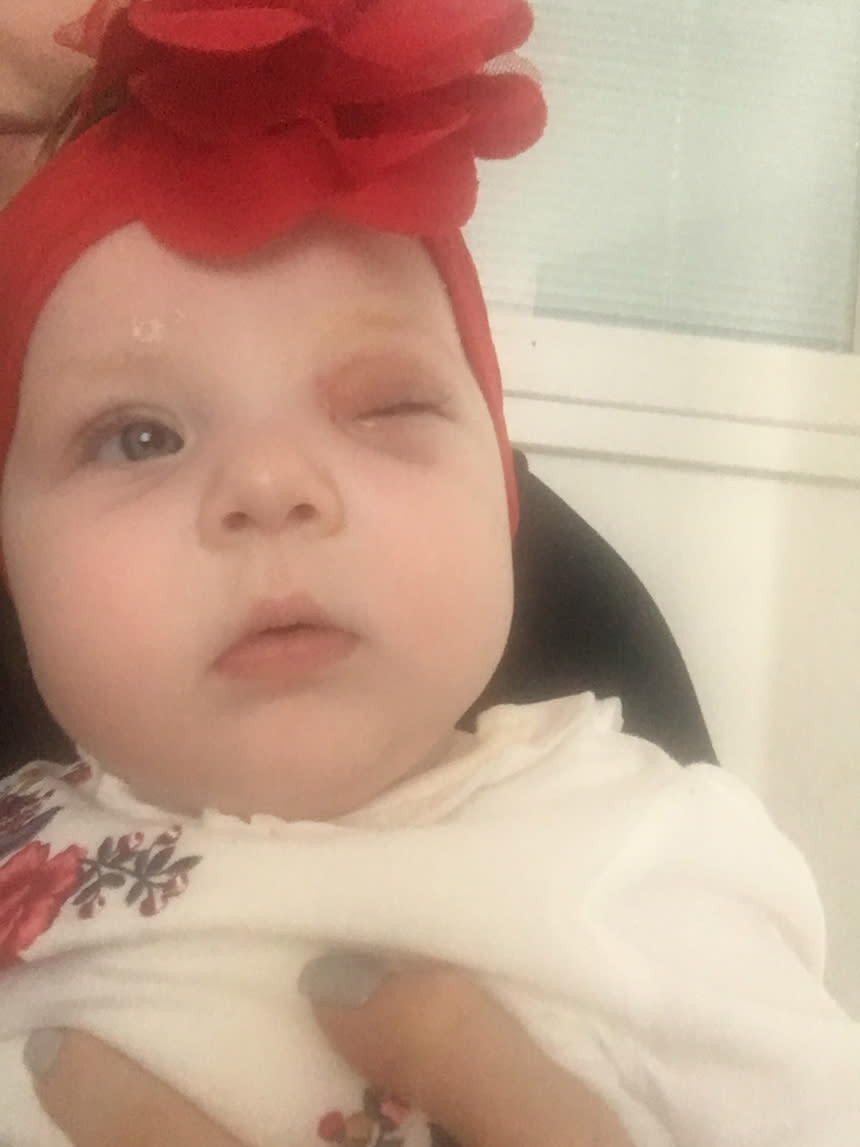Parents spot baby's eye cancer in picture taken with a flash

The parents of a baby girl who lost an eye after they spotted an unusual white glow in a photo taken using a flash have shared their joy after their daughter celebrated her first birthday.
Dela-Rose Denham was just five months old when she had her left eye removed after being diagnosed with retinoblastoma, a rare form of cancer.
Her parents, dental nurse Shelby Simkins and landscaper Ryan Denham, both 26, from Devon, had spotted something unusual after snapping a picture of their daughter and becoming worried by a white glow in her eye caused by the flash.
Though their little girl was born with a squint, the family didn’t think much of it until the picture highlighted a white blur in her right eye.
“I’d taken it after seeing Dela lying facing me on my knees looking at me. She’d just had her milk and it was all over her face, so I wanted a picture for the memory,” Simkins says.
“I took it on my phone and didn’t realise the flash was on, but you could see her right eye was red, while the left one had this white glow in it.
“I thought at first it was just the flash and the funny angle I’d taken the picture at, but I was also concerned at the time about her squint and had been reading up about it.”
Read more: New dad who lost right testicle to cancer celebrates the birth of his baby

Concerned, Dela’s mum decided to read up on babies born with squints and the unusual white patch in her daughter’s eye.
She discovered that the optic nerve doesn't develop until later in babies, but decided to take Dela to a doctor just in case.
The family were then passed on to an optician before Dela was referred to an ophthalmologist, or eye surgeon, at Margate’s Queen Elizabeth The Queen Mother.
Recalling her first appointment, Simkins says: “The ophthalmologist was asking Dela to follow toys around and using a light in her left eye. Her eye was not fixing on anything and she didn’t like the light being shone in it.
“But it was when I mentioned the flash photograph, with the white glow in her left eye, that the ophthalmologist looked worried.”
Following further tests at Dover’s Buckland Hospital, little Dela was diagnosed with retinoblastoma – cancer of the retina caused by a faulty gene.
According to the NHS retinoblastoma is a rare form of cancer affecting under-fives that is diagnosed in around 45 children a year.
“The lovely consultant was going through everything that needed to happen, but we just felt numb,” Simkins says of the moment they were given the diagnosis. “There were a lot of tears that day.
“Even though I thought I’d prepared myself for the worst news, I hadn’t. We just sat outside the hospital in total shock.”
Read more: Heartbreaking photograph shows the reality of childhood cancer

After Dela-Rose was taken to the Royal London Hospital a week later, doctors assessed the tumour, which at this stage was very large.
It was classed as group E, which meant the chances of surgeons saving Dela’s eye were slim.
“We were given the option of removing her left eye or chemotherapy and cryotherapy treatment, which would have been so much to put her through and would not have saved her vision,” Simkins explains.
She continued: “We knew we had to go ahead with having her eye removed to stop the spread of the cancer. We wanted it gone. It was such a big and hard decision to make but we knew it was for the best.”
In October 2019, Dela had a two-hour operation to remove her left eye and have a temporary false eye fitted.
To her parents' relief, blood samples revealed that the cancer had not spread and the retinoblastoma was not in her healthy eye.
In February, Dela was fitted with a moulded eye at London’s Moorfields Eye Hospital.
“Because of COVID-19, they actually had to send the eye in the post, so that was a bit strange!” Simkins says.
“But it looks so good that if you didn’t know she had had cancer, you would not be able to tell it was an artificial eye.
“When our family saw her afterwards they could not believe how amazing it looked.”
The family are now adjusting to life with Dela-Rose’s new eye. “We have to take it out once a week to clean it with soap and water, then pop it back in, which she doesn’t particularly like, but she is getting used to it.”
While she still needs check-ups every four months, her parents were thrilled to be able to celebrate her first birthday on Friday’s May Bank Holiday knowing their little girl was cancer-free.
“We couldn’t really do much because of COVID-19, but I made her a little cake and decorated the house.
“It was very emotional thinking about all we’ve been through over the last year, but she’s such a happy little girl and I’m sure she will cope with whatever life has to throw at her.”
Read more: Girl with neuroblastoma declared cancer-free after pioneering treatment

Dela-Rose’s parents are now working in conjunction with the charity Childhood Eye Cancer Trust as part of World Retinoblastoma Awareness Week, which runs until 16 May.
They hope that sharing their daughter’s story might encourage parents to seek medical help if they are worried their child has any symptoms.
“If you are worried about either a squint or a white glow in your child’s eye, please go to your doctor,” says Simkins.
“Do not worry that you are bothering them. I was worried I was overreacting because I was a new mum, but my story shows that you can never be too careful.”
Read more: ‘Miracle’ IVF baby given all-clear after being diagnosed with rare childhood cancer
Patrick Tonks, chief executive of the Childhood Eye Cancer Trust is also keen for parents to be aware of any tell-tale symptoms.
“COVID-19 is deterring many people from seeking much-needed medical advice, and we are concerned about the delays this may cause in getting undiagnosed children the urgent treatment they may need,” he says.
“The current crisis means that, now more than ever, we need to raise awareness of eye cancer symptoms – the most common being a white glow in the eye and a squint.
“GP surgeries are still ‘open for business’. They are available for consultations online, over the phone or in person if required. Cancer doesn’t stop for a pandemic. We urge parents if they have any concerns at all, not to delay seeking medical help in order to possibly help save their child’s sight, eyes and even life.”
For more information visit chect.org.uk
Additional reporting PA Real Life.



